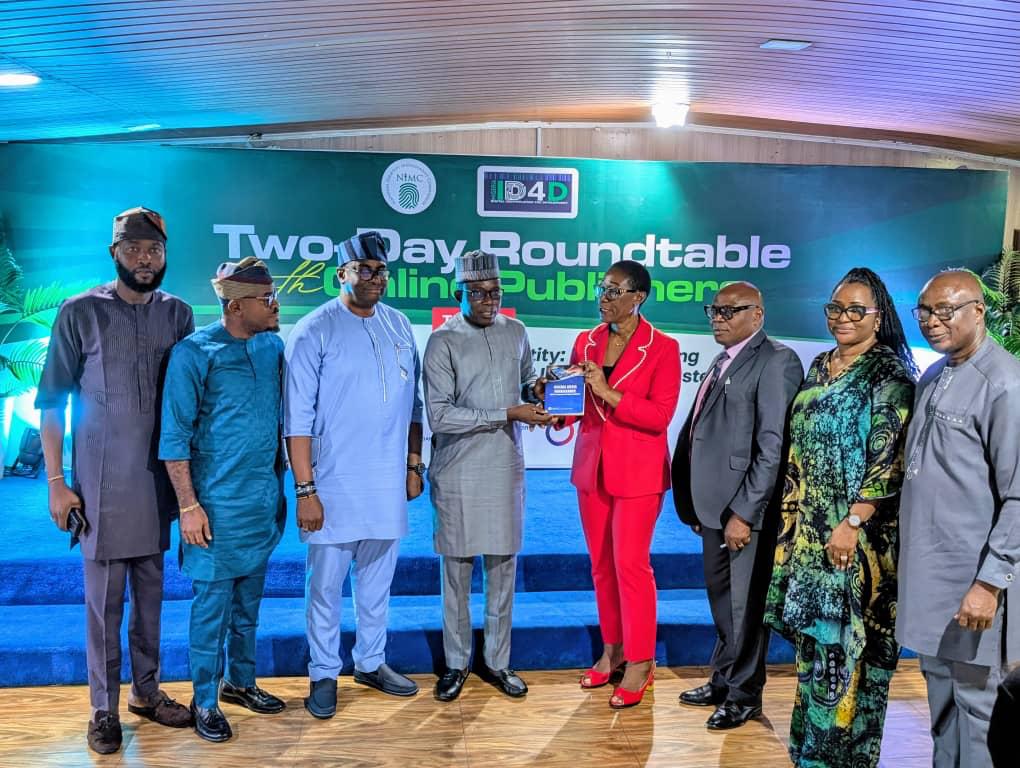
NIMC directors, officials and stakeholders at the two-day workshop for online newspaper publishers in Lagos on Thursday, July 17, 2025.
NIN enrolment hits 122m, 49% increase in three years – NIMC DG
Within three years, between January 2022 and 2025, the National Identity Management Commission, NIMC, has added at least 50 million to its enrolment of Nigerians, to hit 122 million mark currently.
The Director-General of NIMC, Engr Abisoye Coker-Odusote, who disclosed this in her remarks at a two-day workshop with online newspaper publishers in Lagos on Thursday, July 17, 2025, said this is a phenomenal achievement.
According to her, “This represents a 49% increase in enrolment rate, which is a clear testament to the progress we have made in just over three years.”
She said monthly, millions of Nigerians are now being enrolled and issued a verifiable means of identification, unlocking access to critical services in education, agriculture, healthcare, social protection, and beyond.
“We have focused our efforts on addressing the deep-rooted issues that once plagued the identity enrolment process.
“Extortion and unofficial fees have been curtailed by over 40%, thanks to our enforcement of a transparent fee structure.
“Enrolment remains free, and modification and authentication fees are standardised and publicly disclosed,” she said.
On the infrastructure, Engr Coker-Odusote said NIMC has invested heavily in system automation, backend upgrades, and capacity expansion.
She emphasized that NIMC’s strategic collaborations with many government organisations have significantly enhanced service delivery across critical sectors, saying the key partners include the National Health Insurance Scheme (NHIS), Federal Inland Revenue Service (FIRS), Nigeria Immigration Service, Joint Admissions and Matriculation Board (JAMB), Independent National Electoral Commission (INEC), Central Bank of Nigeria (CBN), Federal Road Safety Corps (FRSC), Nigerian Communications Commission (NCC), and the National Correctional Service (NCoS).
‘These collaborations support identity verification for inmates, staff, and service processes within the correctional system. Recent partnerships also extend to the National Social Insurance Trust Fund (NSITF), CreditCorp, and the National Pension Commission (PENCOM), which has integrated its Enhanced Contributor Registration System (ECRS) with the NIMC database to improve data accuracy and reduce pension-related fraud.
“Collectively, these collaborations have streamlined verification processes, enhanced access to essential services, and strengthened public confidence in identity-based systems,” she stated.
Beyond technical integration, she said, “these partnerships continue to deliver tangible benefits to millions of Nigerians. Students now access educational loans more efficiently through NELFUND, while entrepreneurs and small businesses receive timely and transparent disbursements from SMEDAN and the Bank of Industry. Through a NIN-enabled farmer registry managed by the Federal Ministry of Agriculture, verified farmers benefit from targeted subsidy programmes. Workers experience smoother compensation processes via NSITF, and individuals can build verifiable credit histories through CreditCorp. Collectively, these initiatives reflect how a secure and unified digital identity system can open doors to education, financial inclusion, enterprise support, and social protection, driving real and inclusive progress across the country.”
She said NIMC has also introduced digital tools such as the NINAuth mobile app, the Self-Service NIN Enrolment and Modification app, and Contactless Biometric Solutions. “Together, these tools have improved accuracy, reduced waiting times, and empowered millions of Nigerians to securely enroll, update, or verify their identity at their convenience. This aligns our processes with global ID4D standards for data protection and enhances user experience by making identity services faster, more accessible, and citizen-centered,” she said.
